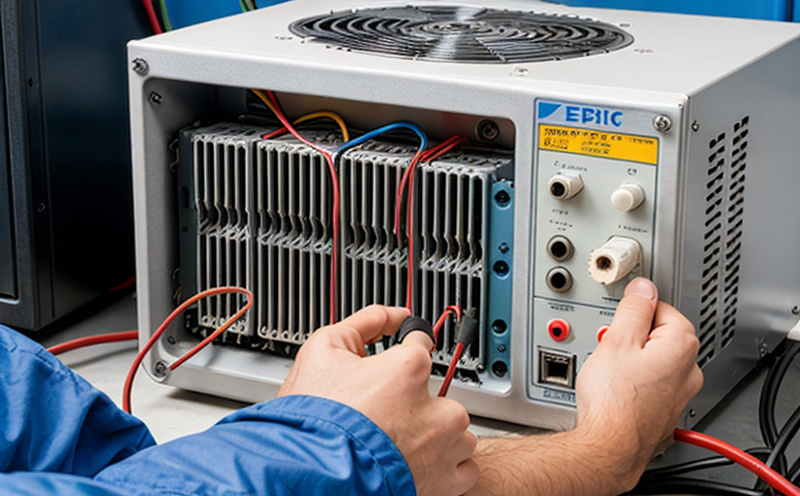IEC 61000 EMC Immunity Testing of Marine Electrical Equipment
The International Electrotechnical Commission (IEC) standard 61000 series provides a framework for ensuring the electromagnetic compatibility (EMC) of electrical and electronic equipment. The Electromagnetic Compatibility EMC Tests and Measurements part, specifically IEC 61000-4-3, focuses on the immunity aspects that ensure systems can function correctly in an electromagnetic environment.
In marine applications, where harsh environmental conditions are prevalent, ensuring EMC is critical. The IEC 61000 series tests help manufacturers demonstrate compliance with international standards, thereby enhancing product reliability and safety for end-users. For instance, the immunity testing measures a system's ability to function correctly when exposed to various electromagnetic interference (EMI) sources.
Electrical equipment in marine environments must withstand the stresses of saltwater, humidity, and vibration, while also ensuring that they do not emit harmful EMI that could interfere with other equipment. This is where IEC 61000-4-3 plays a pivotal role by providing standardized methods for testing.
The test procedures outlined in this standard are designed to evaluate the immunity of electrical and electronic equipment under various electromagnetic interference conditions, including conducted and radiated disturbances. The tests ensure that equipment can operate without degradation when exposed to these types of interference.
For manufacturers and quality managers, compliance with IEC 61000-4-3 is essential for several reasons:
- To meet regulatory requirements in various countries, including the United States, Europe, and China.
- To ensure product reliability under harsh marine conditions.
- To protect against costly field failures due to EMI interference.
- To enhance safety for crew members operating equipment in close proximity to electrical systems.
The testing process involves a series of conducted and radiated immunity tests, including:
- Conducted Immunity Testing: Ensuring the system can operate correctly when exposed to conducted EMI.
- Radiated Immunity Testing: Evaluating the equipment's ability to function correctly in an environment with radiated electromagnetic interference.
The tests are carried out using specialized test facilities that replicate real-world conditions. Equipment is subjected to various levels of EMI, and performance is monitored to ensure it meets the specified acceptance criteria outlined by IEC 61000-4-3.
Compliance with this standard not only ensures product reliability but also facilitates smoother international trade for manufacturers who export their products globally. By adhering to these standards, companies can build a strong reputation for quality and compliance, which is crucial in competitive markets.
Industry Applications
| Industry Sector | Application |
|---|---|
| Marine & Offshore | Towing Vessels, Fishing Boats, and Cargo Ships |
| Naval Defense | Military Vessels and Submarines |
| Offshore Oil and Gas | Platform Lighting Systems and Control Panels |
The IEC 61000-4-3 EMC Immunity Testing is widely used across the marine sector to ensure that electrical equipment can perform reliably under various environmental conditions, including saltwater exposure, humidity, and vibration. This testing ensures that equipment does not interfere with other systems on board ships or submarines, which could lead to safety hazards.
For instance, in naval defense applications, IEC 61000-4-3 helps ensure that electronic control panels operate correctly even when exposed to high levels of electromagnetic interference. Similarly, in the offshore oil and gas sector, platform lighting systems must be immune to EMI to avoid malfunctions that could disrupt operations or lead to safety issues.
The robustness of electrical equipment tested under IEC 61000-4-3 standards is crucial for maintaining operational integrity during critical missions. By adhering to these standards, manufacturers can ensure that their products meet the stringent requirements needed in marine environments.
Why Choose This Test
- Ensures Compliance with International Standards: Compliance with IEC 61000-4-3 demonstrates adherence to international standards, which is essential for global markets.
- Enhances Product Reliability: The tests ensure that equipment functions correctly in harsh marine environments, reducing the risk of field failures.
- Protects Against EMI Interference: Immunity testing ensures that equipment can operate without degradation when exposed to electromagnetic interference.
- Maintains Safety Standards: Ensures that equipment does not interfere with other systems on board ships or submarines, which could lead to safety hazards.
- Simplifies Regulatory Compliance: The standard simplifies the process of meeting regulatory requirements in various countries, including the United States, Europe, and China.
- Facilitates International Trade: By ensuring compliance with international standards, manufacturers can export their products more easily to different markets.
The IEC 61000-4-3 EMC Immunity Testing is a critical step in the development and certification process for marine electrical equipment. It ensures that the equipment meets stringent performance criteria under various environmental conditions, thereby enhancing reliability and safety.
Environmental and Sustainability Contributions
The IEC 61000-4-3 EMC Immunity Testing plays a significant role in promoting sustainability by ensuring that marine electrical equipment operates reliably without causing interference to other systems on board. This reliability is crucial for the efficient operation of vessels, which contributes to reduced operational costs and increased safety.
By reducing the risk of field failures due to EMI, the testing helps minimize downtime and the associated environmental impacts. For instance, in naval defense applications, reliable equipment ensures that missions are completed safely and efficiently without unnecessary delays. In the offshore oil and gas sector, reliable platform lighting systems ensure that operations can continue uninterrupted, contributing to overall efficiency and sustainability.
The standard also supports the development of more robust and efficient electrical systems for marine applications, which can lead to long-term cost savings and environmental benefits. By ensuring compliance with international standards, manufacturers can contribute to a more sustainable global economy by producing reliable and eco-friendly products.





